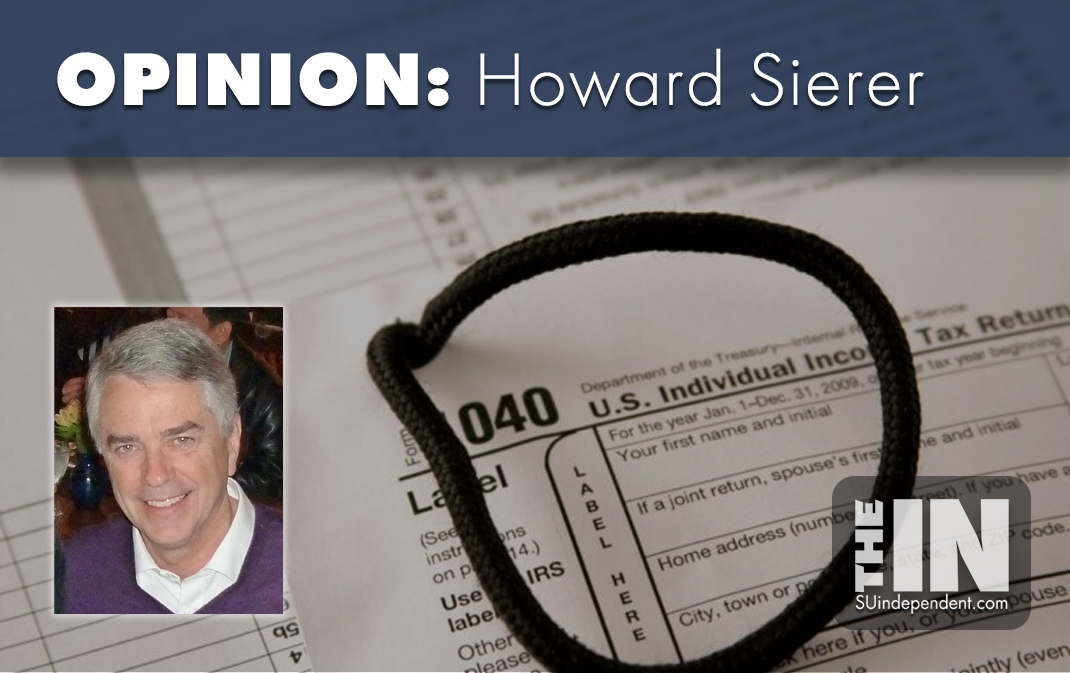
Tax Fairness? Close Loopholes
– By Howard Sierer –
All of us are in favor of tax fairness but agreeing on what’s fair is often well beyond reach, both for our elected representatives and for voters. One person’s justified “tax incentive” is another’s “tax loophole.”
Here are a few tax fairness ideas that, in my opinion, should be acceptable to both the left and the right. If they aren’t, their opponents’ hypocrisy will be on display.
First, eliminate the deduction for state and local taxes (SALT). This loophole primarily benefits higher-income taxpayers in states that have high income and property tax rates. Is this loophole fair? Not to Utah and not to most of the nation’ taxpayers.
Republicans limited that deduction to $10,000 in the 2017 Tax Cuts and Jobs Act. Fair-minded legislators should go further by eliminating the deduction entirely. This would broaden the tax base while removing what amounts to a subsidy for higher-income taxpayers in New York, California, New Jersey and Illinois.
While they are at it, legislators should consider the next logical step: repealing the SALT deduction for businesses, too. Together, eliminating this deduction could bring in several hundred billion dollars over the next decade.
Second, revisit tax exemptions for large nonprofits that generate billions in investment and unrelated business-income. Many entities, such as non-profit universities and hospitals, get generous tax breaks while copying their for-profit rivals in lavishing high salaries and generous perks on their executives. Rather than revoke exemptions entirely, Congress could consider a modest reform such as excise taxes on certain activities or tightening the unrelated business-income rules.
Of particular interest in Utah, the Church of Jesus Christ of Latter-day Saints and its finances have come under scrutiny in the last several years. The church is known for paying its employees modest salaries and all church-owned businesses that do not directly support religious purposes do pay income and other taxes. As explained in a recent Deseret News article, the church violated no tax laws. Referring to the sensationalist media coverage of the church’s finances, the article’s author says, “There appears to be a disconnect between what the tax law is and what reporters think the tax law should be.”
Third, close the so-called “round-tripping” loophole that allows multinational corporations to route profits from sales made in the U.S. through foreign tax havens. The Republican 2017 tax reform reduced the incentive to shift profits offshore, but U.S. multinational firms can still benefit from doing so. Ending this unfair practice would make the code more neutral between domestic-only businesses and global corporations.
Fourth, treat corporate stock buybacks more like dividends for tax purposes. Buybacks function as a tax-advantaged form of distributing earnings, disproportionately benefiting founders of startup companies, many of them in tech industries. Democrats imposed a modest buyback tax in the Inflation Reduction Act, so closing this loophole should attract bipartisan support. Wealthy donors to both parties will likely line up against this one.
Fifth, repeal the preferential qualified small-business-stock exemption for venture-capital profits. This loophole, started under Pres. Clinton and expanded under Pres. Obama, provides a 0% capital-gains rate for venture-capital investments in tech startups. Intended to incentivize funding tech startups, it’s hardly needed these days as new companies with good ideas are showered with cash.
It primarily enriches tech enclaves like Silicon Valley and Boston that fund startups, while leaving most Main Street businesses ineligible. Eliminating it will get vigorous opposition from venture capitalists, but it represents little more than a taxpayer gift to already-wealthy investors.
Closing these five loopholes will enhance tax fairness and allow Congress to congratulate itself for making bipartisan progress. Legislators who oppose one or another of these proposals will have some explaining to do and will give their opponents an issue when they face reelection.
Sadly, while every little bit helps, enacting all five would make only a modest dent in the $2 trillion annual federal budget deficits built in for the coming decade. Social Security and Medicare are the elephants in the room that neither party is willing to touch.
Nonetheless, there is a distinctly partisan proposal that would go a long way to reducing our unsustainable future deficits. The Republican “Limit, Save, Grow Act” would cut trillions of dollars in spending and raise $515 billion in revenue by ending many of the Inflation Reduction Act’s green-energy tax breaks and subsidies. I’m all in favor but it will take a new Congress and a new president in 2025 to breathe life into it.
Anything that can’t go on forever won’t and our $2 trillion annual budget deficits are one of those things. We’ve all been promised a free lunch. Someone is going to have to pay for it: look long and hard in the mirror.



